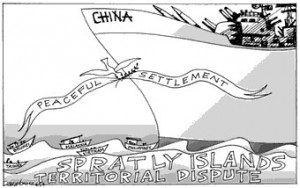Sclerotic
 The “veins,” the arteries of the body to move products and people all across our country” is how former vice presidential candidate Mar Roxas describes, accurately if rather grandiosely, the office he is set to assume at the Department of Transportation and Communications, following the resignation of Secretary Jose de Jesus.
The “veins,” the arteries of the body to move products and people all across our country” is how former vice presidential candidate Mar Roxas describes, accurately if rather grandiosely, the office he is set to assume at the Department of Transportation and Communications, following the resignation of Secretary Jose de Jesus.
“The DOTC is a support service, a utility service. An uneventful day means everything is running smoothly… Whether you are taking a boat, plane, train or bus, we have to ensure that services are safe, affordable and running smoothly,” adds Roxas.
The first part of his statement is Roxas the politician reaching for the expansiveness of rhetoric and metaphor. The second is Roxas the technocrat coming down to earth to attempt to articulate the mission of his new department in clear, practical, no-nonsense terms. Now that he’s been put in charge of one of the most crucial – and also one of the most problem-plagued – areas of governance in the Aquino administration, he will have to call on the two dimensions of his public persona, the consensus-building politician and the dispassionate, brass-tacks technocrat, to work in tandem to help him succeed.
Article continues after this advertisementHe will need all the help he can get. His predecessor was widely acknowledged as a man of probity and competence, but looking at the record objectively, it’s clear even a man of De Jesus’ proficiency never got very far in effecting major changes in the department, or clearing the morass of messy public works projects it had inherited from the Arroyo administration. Of course, there’s politics, too, in that paralysis – De Jesus’ turf war, for instance, with Land Transportation Office chief Virginia Torres, a presidential shooting buddy whom President Aquino apparently favored over the secretary.
It’s hard to imagine Roxas throwing in the towel as De Jesus did if he gets into a similar wrangle with Torres. From all accounts, Roxas enjoys an extraordinarily close relationship with his former presidential running mate. “Mahal ko siya (I love him),” he has said by way of explaining his decision to accept the DOTC post. To be cold-blooded about it, that leverage is something Roxas could use to good advantage now that he is about to reboot a department where the President’s perceived partiality to certain officials in it has generated needless intrigue and division, not to mention a direct impact on public policy given Torres’ muscle-flexing over the matter of the Stradcom payments.
Much of the past weeks leading to Roxas’ reentry into government has seen the nation’s chattering class all but consume itself with speculation about the supposed titanic power struggles that would ensue in Malacañang once Roxas came in and began occupying mass and space in that infamous snake pit. That could still happen, but his quick, no-frills acceptance of the DOTC post has pretty much deflated the direst prognostications. In one stroke, it helped move the discussion forward from De Jesus’ sudden departure, while also addressing a key concern raised by it. This time, the department would have at its helm someone who could bend the President’s ear better than Torres or anyone of her like presumably could.
Article continues after this advertisementAnd Roxas better begin working the presidential ear this early. The challenges he is inheriting are vast and complex, and will require more than a resort to ear-friendly metaphor or rhetoric. Even as the multimillion-dollar Naia-3 case remains unresolved in the courts and the structure itself is operating at less than half its full capacity, the 30-year-old Naia-1 has become a joke with its antiquated technology, collapsing roofs and stinky restrooms. The North Luzon Rail remains incomplete, mired in contractual dispute with its Chinese builder-supplier. Likewise, the P11-billion “roll-on, roll-off” (Ro-Ro) port project approved under the Arroyo administration is now radioactive for being reportedly overpriced and kickback-ridden.
The public need not even concern itself with these knotty projects to know that the DOTC needs to step up and do much more. Every day traffic is horrendous, roads are badly rutted or flooded, LRT/MRT coaches are breaking down with alarming regularity, careening buses are killing hapless commuters on killer highways, and the country’s Internet remains one of the world’s slowest despite the telecom companies’ hype and the Philippines’ bid to become the business process outsourcing capital of the globe. Clearly, those “veins and arteries” are in need of a major overhaul.
















